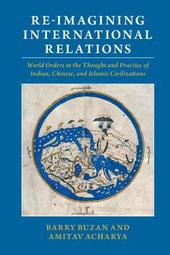
|
Re-imagining International Relations: World Orders in the Thought and Practice of Indian, Chinese, and Islamic Civilizations
Hardback
Main Details
| Title |
Re-imagining International Relations: World Orders in the Thought and Practice of Indian, Chinese, and Islamic Civilizations
|
| Authors and Contributors |
By (author) Barry Buzan
|
|
By (author) Amitav Acharya
|
| Physical Properties |
| Format:Hardback | | Pages:240 | | Dimensions(mm): Height 223,Width 147 |
|
| Category/Genre | World history |
|---|
| ISBN/Barcode |
9781316513859
|
| Classifications | Dewey:333.7 |
|---|
| Audience | | Tertiary Education (US: College) | |
|---|
| Illustrations |
Worked examples or Exercises
|
|
Publishing Details |
| Publisher |
Cambridge University Press
|
| Imprint |
Cambridge University Press
|
| Publication Date |
9 December 2021 |
| Publication Country |
United Kingdom
|
Description
Buzan and Acharya challenge the discipline of International Relations to reimagine itself in the light of the thinking about, and practice of, international relations and world order from premodern India, China and the Islamic world. This prequel to their 2019 book, The Making of Global International Relations, takes the story back from the two-century tale of modern IR, to reveal the deep global history of the discipline. It shows the multiple origins and meanings of many concepts thought of as only modern and Western. It opens pathways for the rest of the world into this most Eurocentric of disciplines, encouraging them to bring their own histories, concepts and theories with them. The authors have written this book with the hope of inspiring others to extend these pathways by bringing in a wider array of cultures, and exploring how they thought about and acted in worlds composed of multiple, independent, collective actors.
Author Biography
Barry Buzan is Emeritus Professor of International Relations at the LSE (formerly Montague Burton Professor); honorary professor at Copenhagen, Jilin, and China Foreign Affairs Universities; a Senior Fellow at LSE Ideas; and a Fellow of the British Academy. Amitav Acharya is the UNESCO Chair in Transnational Challenges and Governance and Distinguished Professor at the School of International Service, American University, Washington, DC. He is a Past President of the International Studies Association (ISA) and has won ISA Distinguished Scholar Awards (for contribution to study of International Organization and Non-Western International Relations).
Reviews'Moaning about Euro-centrism is easy, fixing it a lot harder. Buzan and Acharya's Re-imagining International Relations is a bold and ambitious contribution to the growing body of path-breaking work looking beyond the West in re-thinking IR theory.' Jason Sharman, Sir Patrick Sheehy Professor of International Relations, University of Cambridge. 'Re-imagining International Relations brilliantly challenges taken-for-granted views by examining non-Western theories and practices. Buzan and Acharya's study of diverse civilizations not only shows possible alternatives to understanding international relations but also suggests that ideas and concepts that are often considered as Western innovations have in fact diverse origins. Far from counterfactual speculation, they show how past ideas and processes continue to exert their influence today. In so doing they masterfully demonstrate the value of an historical-civilizational approach.' Hendrik Spruyt, Professor Emeritus, Northwestern University, and author of The World Imagined 'With Re-imagining International Relations, Acharya and Buzan have added yet another thought-provoking book to efforts of globalising the discipline of International Relations. This book will be a welcome addition to any IR theory class.' Ayse Zarakol, Reader in International Relations, University of Cambridge 'This short book packs a disproportionately big punch in advancing Global IR. It does this most impressively by, inter alia, showing how many of the concepts of IR that have for so long been assumed to be Western are in fact more genuinely universal given that they found their place in various ways in pre-modern Islam, India and China, sometimes even pre-dating their emergence in the West.' John M. Hobson, Professor of Politics and International Relations, University of Sheffield
|